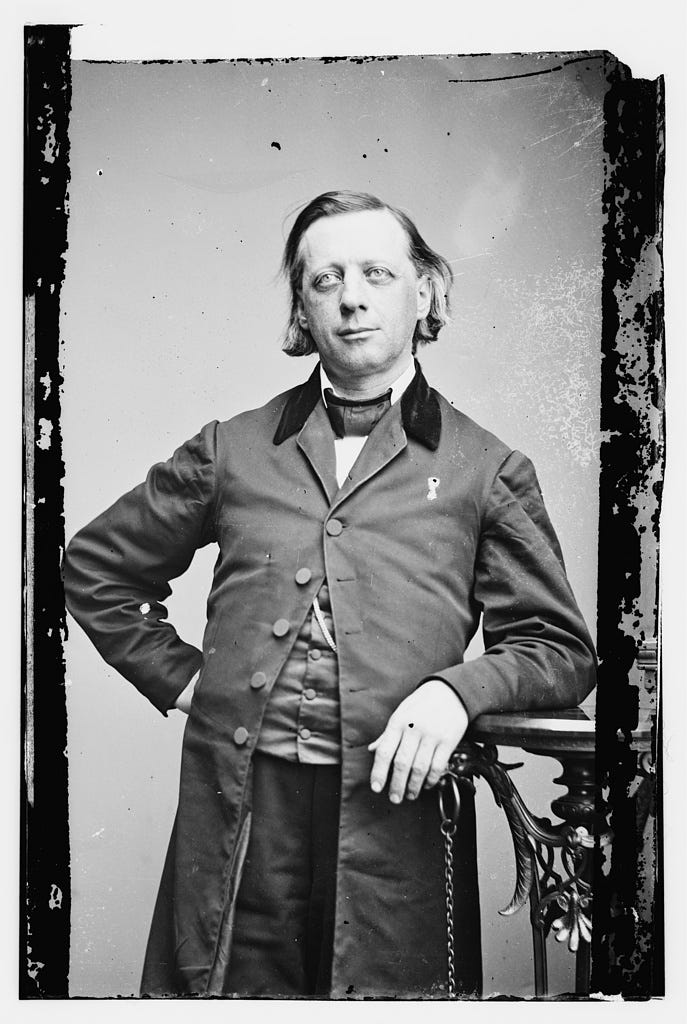What Victoria calls her “bombshell” explodes upon New York when the special issue of the Weekly hits the newsstands at the end of October 1872. Copies fly from the sellers far faster than the printer can deliver them; used copies resell at several times the cover price. Victoria’s tale provokes excited discussion in homes, offices, shops, hotels and restaurants. Briefly it crowds the bigger story—the reelection of Grant—from the public mind. The response solves Victoria’s cash-flow problem: as the reading public demands to hear more, the Weekly resumes regular operation.
Henry Beecher reels from the bomb’s concussion. His career passes before his eyes; everything he has worked for and achieved seems about to be taken from him. In sore distress he consults Frank Moulton on how to respond to Victoria’s charges. “He said he saw no hope for anything since that story had been published,” Moulton testifies later.
Moulton himself is more sanguine. “I told him that I thought silence would kill that story, and that if he kept silence with regard to it, and simply pointed to his life as an answer, saying if that was not the answer he did not to choose to make any, that it would kill that story, in my opinion, so far as any evil effect upon him was concerned.”
Beecher is skeptical; he thinks he must respond, at least indirectly. Will Moulton speak for him?
Moulton considers the request. “I said to Mr. Beecher, ‘If I say anything about it, I think this will be the best thing for me to say uniformly, that if the story was true it was infamous to tell it, and if it was false, it was diabolical to have told it. And if this was not an answer to it I should not choose to make any other to anybody.’”
Beecher decides this is the proper course. He himself says nothing; Moulton speaks on the lines he suggested.
But the story won’t go away. Friends and associates press Moulton on the general substance of the charge. Is Beecher an impure man? “I denied that outright,” Moulton says later. Beecher appreciates the loyalty. “He thanked me for the ground I had taken,” Moulton explains.
Moulton suggests that he and Beecher talk to Theodore Tilton. The three men convene. Beecher wants to know if Tilton put Victoria up to publishing the exposé. Tilton denies it. “Mr. Tilton stated to Mr. Beecher that he was not at all responsible for that story,” Moulton testifies. “Mr. Beecher said he did not believe he was.” Tilton then asks Beecher and Moulton about the best way to deal with the story. Beecher is uncertain, but Moulton reiterates his earlier advice to Beecher. “I told him and Mr. Tilton that I thought it best to be silent with regard to the story.”
Beecher wonders aloud whether Tilton should write a card denouncing Victoria’s story as a lie. Tilton rejects the idea at once. He doesn’t like the notoriety, but he refuses to put the blame on Victoria. “He said it would only lead to further controversy, and he could not denounce this woman to save Mr. Beecher from the result of his crimes,” Moulton recalls. “Mr. Tilton told Mr. Beecher at that interview that he knew perfectly well the circumstances under which he”—Tilton—“came in contact with Mrs. Woodhull, and he said Mr. Beecher must understand that such a card as that would be a very unjust card, and an untrue card for him to publish.”
Beecher becomes emotional again. “Mr. Beecher was deeply affected,” Moulton says. “He did not see any hope, did not see how the story was to be suppressed. He wept—as usual.”
Tilton grows emotional himself. Far from agreeing to collaborate in a denial of the story, he threatens to publish his own version, corroborating Victoria’s account.
Beecher throws himself on Tilton’s mercy. “Mr. Tilton, of course you can do just as you please,” he says. “But I think you ought not to publish that. It will kill me if you publish it.”

